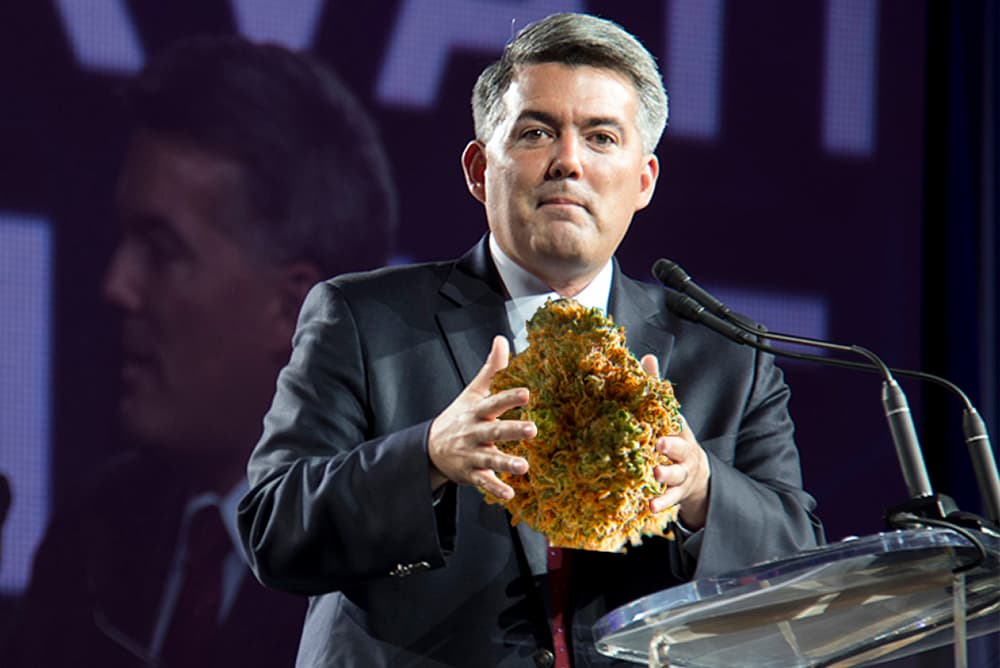
When U.S. Attorney General Jeff Sessions revoked the Cole Memorandum, a memo outlining how the feds would govern marijuana in light of state's legalization of weed, it caused some worries that President Donald Trump's administration was about to crack down on Colorado's legal weed industry.
Those worries should be largely alleviated — for now — after U.S. Sen. Cory Gardner announced Friday that he had struck a deal with the Department of Justice to keep guidelines outlined in the Cole Memorandum in place. The memorandum was revoked by Sessions in Jan. 4.
While he waited to ensure Colorado's state's rights, Gardner refused to approve of any DOJ nominees. He said in a release that he received a commitment from Trump on Wednesday assuring him that he would support "a federalism-based legislative solution to fix this states' rights issue."
“Since the campaign, President Trump has consistently supported states’ rights to decide for themselves how best to approach marijuana,” Gardner said in a release. “Late Wednesday, I received a commitment from the President that the Department of Justice’s rescission of the Cole memo will not impact Colorado’s legal marijuana industry. "
The Trump administration's decision means Gardner will lift remaining holds on DOJ nominees.
"My colleagues and I are continuing to work diligently on a bipartisan legislative solution that can pass Congress and head to the President’s desk to deliver on his campaign position," Gardner said.
The Cole Memorandum established the federal government's "hands-off" approach on states with legal weed.
The four-page memo was issued Aug. 29, 2013, and updated guidelines for how the government would enforce the Controlled Substance Act, a federal law. When states like Colorado passed ballot initiatives legalizing recreational marijuana, the government decided it wast time to update its policies.
The memo starts by reminding its readers that Congress "has determined that marijuana is a dangerous drug" and its sale and distribution "is a serious crime" that's a source of money for "large-scale criminal enterprises."
In a statement announcing the memo's removal in January, Sessions outlined why he disagreed with it. Session's rules would be "a return of trust and local control to federal prosecutors," he said.
"(The) previous issuance of guidance undermines the rule of law and the ability of our local, state, tribal, and federal law enforcement partners to carry out this mission," Sessions said in the release.
High-profile elected officials in Colorado supported the state's right to continue selling recreational pot.
Gov. John Hickenlooper discussed the memo earlier this week in an interview with Rolling Stone, saying he has spoken to Sessions about Colorado's industry.
Hickenlooper said Sessions told him any kind of additional drug use makes the country weaker rather than stronger. Hickenlooper touted the tax revenue from marijuana businesses and talked about studies hushing fears that there would be an uptick in overall use.
“This is a reasonable and promising development," Hickenlooper said in an emailed statement to Denverite. "The Department of Justice will get far greater benefit per dollars spent by continuing to focus on major crimes such as heroin, meth and human trafficking.”
State Attorney General Cynthia Coffman, a Republican gubernatorial candidate, told CPR in January that it would "defend the will of the people" when discussing the state's laws.
"Everyone is doing their very best to keep folks safe, to keep marijuana out of the hands of kids, which is certainly an important emphasis for me in my role, to make sure that we deal with drugged driving," Coffman told CPR. "I think that all of those things work together to protect public health and safety, but we have a provision now in our constitution, and we have statutes that carry this out, and we have regulations in our agencies."
The pro-marijuana business advocacy group Colorado Leads, which includes more than 50 Colorado companies, issued a release Friday thanking Gardner for his leadership in the issue. Board President Chuck Smith said in the release that Gardner's "tireless efforts" provide certainty for the marijuana industry, which he said employees thousands of people.
“We are also fortunate to have state elected officials, like Gov. John Hickenlooper, who have supported cannabis companies and worked with us to create a responsible and strictly regulated industry, which is considered the model for other states," Smith said in the release.












